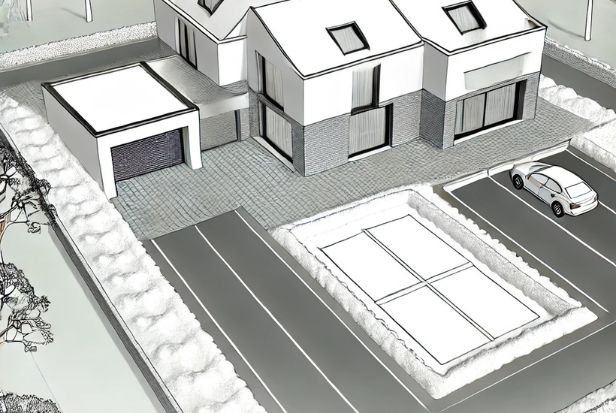At The Harlow Group, we are a family-run, local business committed to delivering dependable, high-quality snow removal services at an affordable price. With deep roots in our community, we’ve worked hard to build a reputation for excellence, becoming a trusted name in snow management throughout the area.
From the beginning, our goal has been simple: to provide reliable, efficient snow removal services that exceed our customers’ expectations. We understand the importance of keeping your property safe and accessible during the harsh winter months, and we take pride in our ability to handle every job with precision and care.

Snow Removal services
Anybody with a pickup and a blade can plow snow. At Landscaping, we employ certified snow professionals who actually study the mechanics of how snow behaves. We consider how snow melts, the consequences of freezing.

Snow Removal services
With more space to cover, our double laneway service focuses on clearing two-car driveways, ensuring the entire surface is free of snow and ice. We make sure there’s ample space for both vehicles to park and maneuver.

Snow Removal services
Triple laneways require extra care and precision, especially after heavy snowfall. Our team will clear the full width and length of your driveway, making sure all vehicles have clear access and the surrounding areas are safely maintained.

If your laneway has additional parking or turning areas, our service extends to those spaces as well. We’ll make sure every corner and extension is thoroughly cleared, providing you with safe, complete access to all parts of your driveway.
No matter the size or type of laneway, The Harlow Group ensures your driveway is always clear and safe. Contact us today to schedule your snow removal service!
FREQUENTLY ASKED QUESTIONS
Bipolar disorder is a mental health condition characterized by extreme mood swings that include emotional highs (mania or hypomania) and lows (depression). These mood swings can affect energy levels, activity levels, judgment, behavior, and the ability to think clearly.
There are several types of bipolar disorder, including bipolar I disorder, bipolar II disorder, cyclothymic disorder, and other specified and unspecified bipolar and related disorders. Bipolar I disorder involves manic episodes, while bipolar II disorder involves hypomanic episodes and depressive episodes.
Symptoms of bipolar disorder can vary depending on the type and severity of the mood episode. Manic symptoms may include elevated mood, increased energy, racing thoughts, and reckless behavior. Depressive symptoms may include sadness, fatigue, changes in sleep or appetite, and thoughts of death or suicide.
Bipolar disorder is typically diagnosed by a mental health professional based on a thorough evaluation of symptoms, medical history, and family history. The clinician may also use diagnostic criteria outlined in the Diagnostic and Statistical Manual of Mental Disorders (DSM-5).
Treatment for bipolar disorder often includes a combination of medication, such as mood stabilizers, antipsychotics, or antidepressants, and psychotherapy, such as cognitive behavioral therapy (CBT) or interpersonal and social rhythm therapy (IPSRT). Lifestyle changes, such as maintaining a regular sleep schedule and avoiding alcohol and drugs, can also be beneficial.